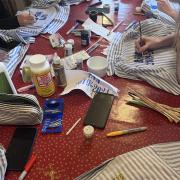
I would not have personally predicted toilet paper would have been the first thing to go.
It’s almost ironic that President Biden’s most exacting challenge is to soothe and heal the rugged breakages in a fractured American society - breakages that fight back - yet it is a mob mentality, one of unity and commonality, that caused an insurrection just fourteen days before his inauguration. Lying in my bed, watching the ferocity, the fanaticism and the consensus burn through the Capitol building as shown in my many news notifications, trumping (pun intended) my usual feed littered by relative Co-vid normalcy, may have been so distressing and so foreign because in the UK many of us are more alone than we’ve ever been before. Or at least it seems like it…
But perhaps the power of the mob mentality lives on. I find myself asking (and perhaps you should too!) is that not just what ‘panic-buying’ is? Tracey from four doors down buys 10 pints of milk and if we don’t then obviously there’s not going to be any left when we need it so maybe we should buy lots too - just in case. Scientifically, panic-buying is actually a type of ‘herd behaviour’, where individuals do things in groups they would not do on their own. For better or for worse. It's something primally animalistic – a strangely comforting certainty in such an uncertain time, one might argue. 'Panic-buying' is also a self-fulfilling prophecy, as people buy more it leads to genuine shortages.
Domestic terrorists and toilet roll are not the only examples of herd behaviour. Economic consumerism is one thing, but I’m willing to bet that you’ve done a Joe Wicks workout, baked banana bread, made a TikTok, cut someone’s hair (bonus points if it was your own) with no experience or participated in a Zoom quiz since March 2020. If you, like me, answered yes to any of the aforementioned, I don’t think you would need me to tell you, you’re in the majority.
When I asked local student Florence Thomas if she thought the trends were prevalent in north-east London she told me: ‘I am somewhat ashamed to admit, that I did download TikTok during the first lockdown and after lamenting how pointless the exercise of scrolling through mindless videos of glossy American dancers was, I found myself doing exactly the same thing!’ Which is a strange, but very common observation when it comes to trends. How could anyone possibly do that? And then we also end up doing it.
She went on to say, ‘during these mentally draining times of relentless separation from friends and the wider community, I would like to say that things like trends, which everyone partakes in on a public platform, are crucial in weaving together an isolated society, but I think that things like TikTok and the trend where people dyed their hair, were used more as vessels of escapism than anything else. Donning identically botched home-dyed hair jobs or similarly flat banana bread is a way of basking collectively in the endearing self-deprecatory humour that used to knit society together pre-pandemic. Unfortunately, I wasn't brave enough to go at my brown bob with a pair of kitchen scissors or indeed, a bottle of shop-bought hair dye … but I have friends who did have a go in the spirit of delicious lockdown abandonment, and they didn't do at all a bad job!’
Similarly, Maddie Busfield-Payne told me that ‘[she] spent countless hours competing against virtual Beth Harmon, The Queens Gambit had me in awe of her.’ She also commented on the power of these trends to make people feel almost invincible, raiding the Capitol building or convincing yourself you’re Gordon Ramsey in the kitchen – ‘most grandmasters in chess start much younger than I am now, and although most people who have watched the show have convinced themselves of this too, I am convinced I will beat Borgov by the year 2027.’
Clearly, the MAGA mob and the Couch to 5k app have wielded the weapon of herd behaviour in different battles, for different purposes. Probably the most insightful dives into herd behaviour recognise its non-binary nature first. But more importantly, it perpetuates that no matter how divided we become, politically or physically, our societal and primal humanity prevails. We might be separated, but we’re never going solo.



























